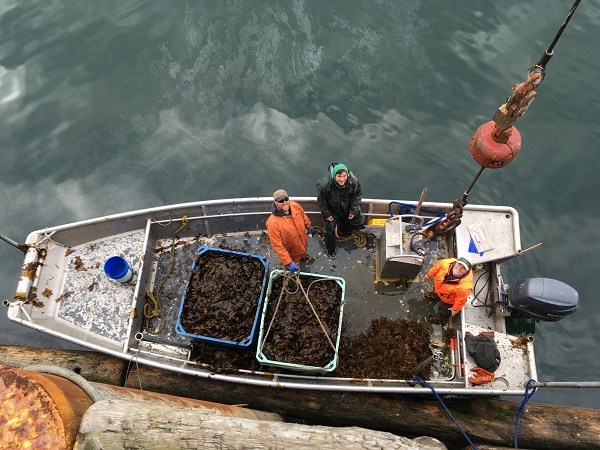
Commercial seaweed farming could be the hot new industry in Alaska, and Kodiak is getting in on it.
Blue Evolution, a company from the Lower 48 that turns seaweed into pasta products, has partnered up with both Alaska and out-of-state groups to harvest and process the super food in Kodiak.
According to Blue Evolution, the first harvest of the year in Ketchikan yielded less than expected because of high winds and otherwise bumpy weather. They’re holding out hope for Kodiak.
Commercial fisherman Nick Mangini is out into the waters of Trident Basin in the City of Kodiak.
Somewhere just beneath the surface of the ocean, his seaweed is ready for harvest.
Mangini and his crew crank a line heavy with seaweed onto the skiff and use sickles to hack away at the leaves.
They’ll fill two large containers and then take them back to the dock to weigh them. They estimated Mangini’s entire site of sugar and ribbon kelp will yield about 15,000 pounds of seaweed.
But the process started in a lab in Juneau, with Blue Evolution’s Tamsen Peeples, who handles the company’s Alaska operations. She’s also one of Mangini’s crewmembers today.
“We collected fertile material here in August, and they shipped it down to me in Juneau, and I spored out the material onto the seeded line which we then shipped back to them after six weeks, and they outplanted it onto the longline,” Peeples.
Mangini said they planted the seaweed in December. It’s one of two sites in the Kodiak Archipelago. The other is in Larsen Bay.
Mangini said the harvest comes after a lot of experimentation, planning, rescheduling and test runs.
“We don’t really know how to do this the best way yet,” Mangini said, “This is just kinda what we come up with for what we know will work this year. But it seems to be working pretty good.”
Mangini has ideas for where they could take commercial seaweed harvest in Kodiak.
“Obviously, in the future, we’d like to get into a fresh market because if you blanch this and freeze it – there’s a lot of options for fresher markets,” Mangini said. “It’s really good salad.”
The skiff heads back to land, and a crane lowers hooks down so that the crew can secure the containers.
From there, the seaweed heads over to Near Island for processing at the Kodiak Seafood and Marine Science Center.
Down in the pilot plant, Alaska Sea Grant and other project partners are doing a test run on a machine brought in superficially for the project. It’s loud from outside the building, and deafening from inside it.
During a break, Peeples steps outside the pilot plant door wearing a hair covering and ear protection.
She said they just got approval to turn the machine on following a weeklong delay.
After so many unknowns, and a not-so-successful harvest in Ketchikan, Peeples is relieved to see some success in Kodiak.
“It was fantastic to get here, go out, pull up his lines and just see this beautiful, thick, healthy kelp,” Peeples said.
Peeples said Blue Evolution would be interested in bringing more seaweed farmers into the project. She said it depends on who can get permits and how much space Blue Evolution has in its hatchery.
